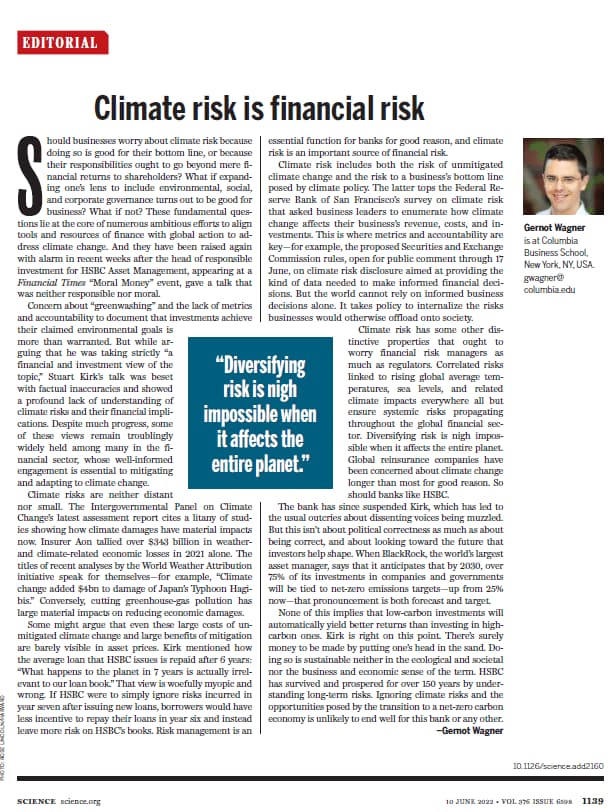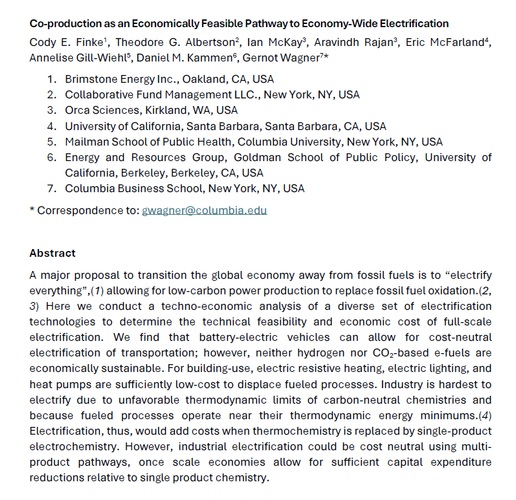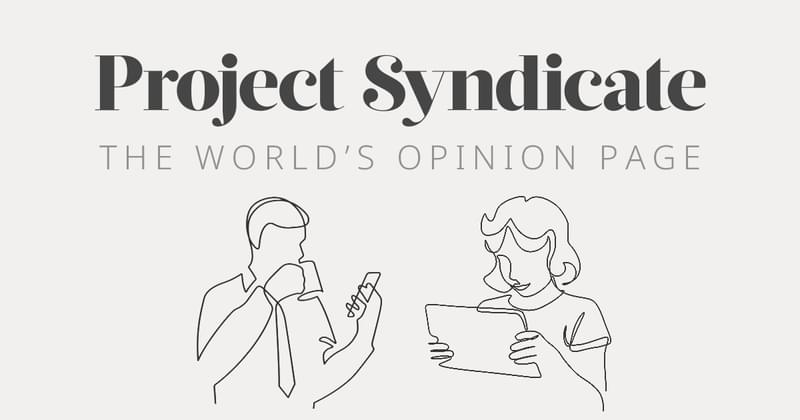Climate risk is financial risk
“Diversifying risk is nigh impossible when it affects the entire planet.”
Should businesses worry about climate risk because doing so is good for their bottom line, or because their responsibilities ought to go beyond mere financial returns to shareholders? What if expanding one’s lens to include environmental, social, and corporate governance turns out to be good for business? What if not? These fundamental questions lie at the core of numerous ambitious efforts to align tools and resources of finance with global action to address climate change. And they have been raised again with alarm in recent weeks after the head of responsible investment for HSBC Asset Management, appearing at a Financial Times “Moral Money” event, gave a talk that was neither responsible nor moral.
Concern about “greenwashing” and the lack of metrics and accountability to document that investments achieve their claimed environmental goals is more than warranted. But while arguing that he was taking strictly “a financial and investment view of the topic,” Stuart Kirk’s talk was beset with factual inaccuracies and showed a profound lack of understanding of climate risks and their financial implications. Despite much progress, some of these views remain troublingly widely held among many in the financial sector, whose well-informed engagement is essential to mitigating and adapting to climate change.

Climate risks are neither distant nor small. The Intergovernmental Panel on Climate Change’s latest assessment report cites a litany of studies showing how climate damages have material impacts now. Insurer Aon tallied over $343 billion in weather- and climate-related economic losses in 2021 alone. The titles of recent analyses by the World Weather Attribution initiative speak for themselves—for example, “Climate change added $4bn to damage of Japan’s Typhoon Hagibis.” Conversely, cutting greenhouse-gas pollution has large material impacts on reducing economic damages.
Some might argue that even these large costs of unmitigated climate change and large benefits of mitigation are barely visible in asset prices. Kirk mentioned how the average loan that HSBC issues is repaid after 6 years: “What happens to the planet in 7 years is actually irrelevant to our loan book.” That view is woefully myopic and wrong. If HSBC were to simply ignore risks incurred in year seven after issuing new loans, borrowers would have less incentive to repay their loans in year six and instead leave more risk on HSBC’s books. Risk management is an essential function for banks for good reason, and climate risk is an important source of financial risk.
Climate risk includes both the risk of unmitigated climate change and the risk to a business’s bottom line posed by climate policy. The latter tops the Federal Reserve Bank of San Francisco’s survey on climate risk that asked business leaders to enumerate how climate change affects their business’s revenue, costs, and investments. This is where metrics and accountability are key—for example, the proposed Securities and Exchange Commission rules, open for public comment through 17 June, on climate risk disclosure aimed at providing the kind of data needed to make informed financial decisions. But the world cannot rely on informed business decisions alone. It takes policy to internalize the risks businesses would otherwise offload onto society.
Climate risk has some other distinctive properties that ought to worry financial risk managers as much as regulators. Correlated risks linked to rising global average temperatures, sea levels, and related climate impacts everywhere all but ensure systemic risks propagating throughout the global financial sector. Diversifying risk is nigh impossible when it affects the entire planet. Global reinsurance companies have been concerned about climate change longer than most for good reason. So should banks like HSBC.
The bank has since suspended Kirk, which has led to the usual outcries about dissenting voices being muzzled. But this isn’t about political correctness as much as about being correct, and about looking toward the future that investors help shape. When BlackRock, the world’s largest asset manager, says that it anticipates that by 2030, over 75% of its investments in companies and governments will be tied to net-zero emissions targets—up from 25% now—that pronouncement is both forecast and target.
None of this implies that low-carbon investments will automatically yield better returns than investing in high-carbon ones. Kirk is right on this point. There’s surely money to be made by putting one’s head in the sand. Doing so is sustainable neither in the ecological and societal nor the business and economic sense of the term. HSBC has survived and prospered for over 150 years by understanding long-term risks. Ignoring climate risks and the opportunities posed by the transition to a net-zero carbon economy is unlikely to end well for this bank or any other.
This editorial was first published by Science on 10 June 2022. (PDF)


